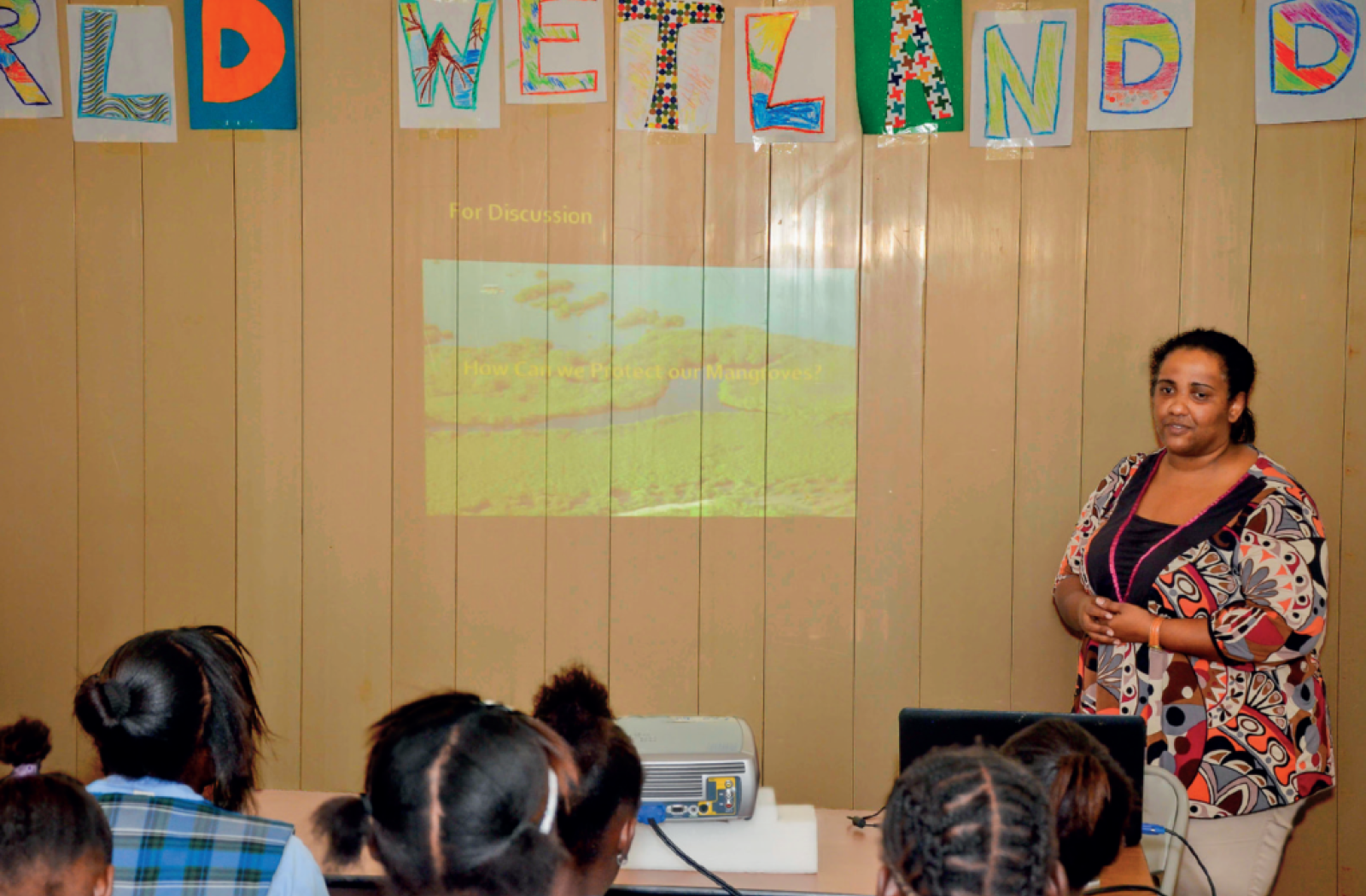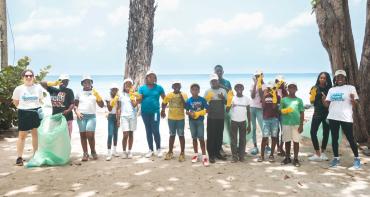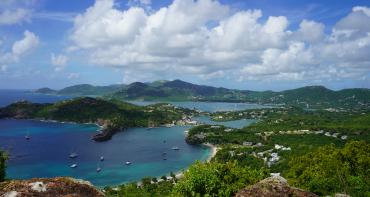The Commonwealth Blue Charter is highlighting case studies from the Commonwealth and beyond, as part of a series to spotlight best practice successes and experiences.

Share your own case study with us
“The field of ocean science is constantly changing and to be relevant and current and at
the top of your game, you have to constantly seek opportunities to learn.”Tricia Lovell, Acting Deputy Chief Fisheries Officer, Fisheries Division, Antigua and Barbuda

Tricia Lovell conducting seagrass monitoring in Antigua and Barbuda. Photo credit: Gregg Moore, SeagrassNet
Background
Tricia Lovell is the Acting Deputy Chief Fisheries Officer at the Fisheries Division of Antigua and Barbuda, an island in the Caribbean. In Lovell’s work, she looks at fisheries issues as well as those related to the marine ecosystem and biodiversity conservation, environmental education and outreach, CITES and coastal zone management. She also serves as the National focal to the Wider Caribbean Sea Turtle Network (WIDECAST), and the marine and coastal focal point to the Convention on Biodiversity.
Lovell completed her bachelor’s in biology and maths at the University of the West Indies, Barbados, and her master’s in marine management at Dalhousie University, Canada. She has also taken part in shorter-term professional development opportunities, such as the three-month International Ocean Institute (IOI)¹ training programme on the UN Convention on the Law of the Sea, at Dalhousie University, as well as fellowships at the UN through the Nippon Foundation², and the United Nations Fisheries Training Programme in Iceland among others. Lovell began at the Fisheries Division in 1998 as a fisheries officer, and has remained there, taking on more senior roles.
While growing up on Antigua and Barbuda, Lovell participated in marine biology-related programmes along the coast, put on by the local library, which sparked her interest in biology and ocean science. She attributes her success to gaining international scholarships that allowed her to complete her education, and to an important mentor who was Lovell’s supervisor when she started working for the Fisheries Division, and whom Lovell says encouraged her employees to learn and pushed everyone equally to succeed.
Lovell explains that significant barriers exist in the Caribbean to women entering and having success in her field. Barriers include a lack of employment opportunities and cultural expectations about the kinds of jobs held by women and men. To succeed, Lovell offers to the next generation this advice: find your passion, constantly seek opportunities to learn and find good role models.
Path to success
Q: What is your background and your path that lead you to where you are today?
The public library used to have these summer programmes when I was growing up, and some of them would offer the kids the opportunity to go out in the field and experience different things. I found I gravitated to things that required me to be out in the field.
My background is in natural sciences. I did my undergraduate degree in biology and mathematics at the University of the West Indies. I focused on things that I liked. I liked biology mostly because it took us out of the classroom setting to experience different things, and a lot of those things on an island are in the coastal environment.
When I finished school and came back to Antigua, I lectured part-time at the First Year University Programme at the Antigua State College and continued to do so even after getting a full time job at the Fisheries Division. After my first year at the State college, I was contacted and told there was an opening at the Fisheries Division, and that’s how I ended up applying. What I liked about fisheries at the time was that it was being led by a woman, and she was a very good role model and a strong woman, very direct. She always gave us opportunities and freedom. We were able to have the flexibility to run our own programmes. She also encouraged us quite a bit to keep seeking opportunities for learning.
Q: What helped you succeed?
I think a lot of it was some of the strong women I was exposed to at secondary school all the way up to university. Once I was working in the Fisheries Division, I got the opportunity to go to a lot of different programmes and courses. I was able to meet Elisabeth Mann Borgese, “Mother of the Ocean,” which was the highlight of my life to this point, at the IOI programme [at Dalhousie University, Canada]. Borgese was instrumental in the law of the sea process.³
I constantly try to keep myself updated on changes in the field. I’ve taken advantage of a lot of training opportunities as a result: the IOI programme, fellowships at the UN through the Nippon Foundation, training on the Law of the Sea, training on CITES. We’re a fisheries department but our mandate is so much broader. We deal with issues like CITES listings, coastal zone management, etc. To be able to fit in any role, I ended up becoming a generalist, having a lot of knowledge of a lot of different things because of the nature of the work.
Barriers overcome
Q: What barriers have you overcome to become a woman ocean leader?
I’ve been very lucky. If I had to pay my own way through school, I wouldn’t be where I am today. My mother definitely couldn’t afford to send me to my master’s in Canada. I’ve been lucky in that respect: I’ve been able to get scholarships and fellowships and funding to do my education. Those were the opportunities that were available to me that I’m grateful for. I’ve been able to find great opportunities and capitalise on those.
Caribbean culture is very male-centric. When you go into a meeting setting, you’re looking at a lot of men. Sometimes they can be dismissive of the female in the room. A lot of our leaders and politicians are males. You have to be strong so you’re not lost in the conversation.
Q: What barriers exist in the region to women entering and staying in your field?
One of the things that’s striking, particularly in the life sciences, is there’s an imbalance, a higher enrolment of females than males at the university campuses across the region, but sometimes it doesn’t necessarily mean that the imbalance is evident in the workforce. In fisheries, and probably in fisheries across the region, you’ll see more men.
In my department, we don’t have a lot of people who are technically focused on fisheries. They come at it from different perspectives. My path grounded me in the marine sciences. When I was in school, fisheries was not apparent as a viable career option in the Caribbean. In fact I don’t think it would have even been on the average student’s radar, and certainly not on mine.
Fisheries, and marine science more broadly, offer limited opportunities for employment in Antigua and Barbuda. We do not have major research labs and at the time that I was searching for higher educational opportunities, there was no full university on the island. As a result, I was only able to complete my first year of university at the local state college before moving on to the Cave Hill Campus of the University of the West Indies. The options were limited to teaching or working in the government service. The lack of a university on the island also meant we were forced to look outside Antigua and sometimes outside the region for educational opportunities, which would have been out of reach financially for me without the assistance of scholarships and grants. Luckily, I was successful in receiving a government grant for my undergraduate degree and a scholarship for my master’s as well as a number of other fellowships along the way.

Tricia Lovell giving a World Wetlands Day lecture to primary school students in Antigua and Barbuda. Photo credit: Fisheries Division of Antigua and Barbuda
Key lessons learnt
Q: What do women need to succeed as ocean leaders in your region?
You need to have a certain amount of strength, and you need to make sure you’re backing up your strength with information, and this applies to everyone. If you’re going to be discussing an issue, you need to demonstrate you know what you’re talking about.
A lone female voice might get lost. You have to go in with the facts and information. Be prepared to back up whatever you’re presenting. That is the approach I take: be strong and stand your ground. That’s the same thing I admired about my former boss. She didn’t allow anyone to walk over her.
Advice for the next generation
Find your passion
I took the path that I took based on the things I like. If you don’t have the passion, then you can easily get lost, or you won’t capitalise on opportunities to continue to learn. If you’re not interested, you won’t do the work needed to succeed. Make sure you follow the path that creates excitement for you.
Constantly seek opportunities to learn
Recognise that learning never stops. The field of ocean sciences is constantly changing and, to be relevant and current and at the top of your game, you have to constantly seek opportunities to learn. Go into every situation with an open mind; there’s always something new that can be learnt. Particularly when you’re coming from a society where a lot of the leadership is still very male-dominated, you have to make sure you are on top of knowledge and information so that your voice is not drowned by others.
Find good role models
I’ve been very fortunate to have a lot of strong women around me, both personally and professionally, who’ve been able to encourage me.
Endnotes
- http://internationaloceaninstitute.dal.ca/
- https://www.nippon-foundation.or.jp/en/
- https://www.dal.ca/about-dal/dalhousie-originals/elisabethmann-borgese.html
Download this case study (PDF)
View all Case Studies
Media contact
- Josephine Latu-Sanft Senior Communications Officer, Communications Division, Commonwealth Secretariat
- +44 20 7747 6476 | E-mail



